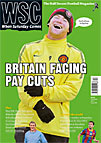 Simon Hart looks back at the 1980s experiment that was the Screensport Super Cup
Simon Hart looks back at the 1980s experiment that was the Screensport Super Cup
Football loves its anniversaries but not even the most nostalgic-minded supporters are likely to dwell for too long on the Screensport Super Cup, the ill-conceived substitute for European football that began its short life 25 years ago this autumn.
Introduced as an alternative source of revenue for those clubs denied Europe by the post-Heysel ban, it was a six-team tournament comprising the top five from 1984-85 – Everton, Liverpool, Tottenham Hotspur, Manchester United and Southampton – together with Norwich City, the relegated League Cup winners.
Even before a ball was kicked the Times suggested the Super Cup “makes sense only in the land of greed” and so it proved. The competition failed to capture the imagination of players and public to such a degree that the two finalists, Everton and Liverpool, did not actually get round to deciding the winner until the following season.
Looking back from the distance of a quarter-century, Sir Philip Carter, the former Everton chairman and Football League supremo, admits it belonged in the file of football’s bad ideas – though unlike other proposals of the time, such as ID cards and Ken Bates’s electric fence at Stamford Bridge, this one got off the ground.
“Ideas are generated which perhaps sound a good idea without thinking it through too well, and that is really how it emerged,” Carter said. “There was probably some thinking behind it that it may help but it wasn’t successful at all.”
The Super Cup started in September 1985 with two three-team groups, the top two from each advancing to the semi-finals. On the eve of the opening fixtures, the Football League announced it had found a sponsor in Screensport, a European satellite sport channel which paid £254,000 for the dubious privilege of having its name attached to one of the biggest wastes of time in English football history.
The first round of games brought the tournament’s only plus-30,000 attendance, with 33,859 at Old Trafford to see Man Utd lose 4-2 to champions Everton – the first game that Ron Atkinson’s early Division One leaders had failed to win that season.
Man Utd would be the notable casualties of the group stage as Norwich ended up taking second place in their section behind Everton. Liverpool and Tottenham advanced from the other pool, ahead of a Southampton side who drew the competition’s smallest crowd – 4,680 at The Dell for a December defeat by Spurs.
By then the Times – sceptical from the outset – declared that the tournament was “justifiably regarded by the public as a larger version of Trivial Pursuit. For significance it overshadows only the ludicrous Full Members Cup which was brought in merely to appease the rest of the First and Second divisions.” (Nevertheless, unlike the one-off Super Cup, the Full Members Cup would limp on for six seasons more, until 1992.)
Peter Shreeves, the Tottenham manager, delivered a similar verdict after White Hart Lane recorded its lowest attendance since 1947 when only 7,548 turned up for the semi-final first leg against Everton on a bitter February evening. After an Everton side missing seven first-teamers had clung on for a goalless draw, Shreeves said: “I suppose it’s fair to say the public have not fallen in love with it.”
Norwich and Liverpool drew 1-1 on the same night but while Everton booked their final place the following month, beating Spurs 3-1 at Goodison, their neighbours only concluded their own semi-final in May. Bizarrely, Liverpool’s 3-1 defeat of Norwich came three days after they had sealed the League title and four days before they secured the Double with an FA Cup final triumph over Everton.
The 26,690 at Anfield probably got more out of seeing their favourites show off the Championship trophy than from the prospect of another all-Merseyside final, particularly as this one would be played out over two legs. So, unlike the Full Members Cup, which got a Wembley date between Chelsea and Manchester City (how times have changed for that pair), the destiny of the Screensport Super Cup was settled on Merseyside in September 1986, Liverpool winning 3-1 at Anfield, then 4-1 at Goodison.
Not that it was much cause for celebration. Liverpool manager Kenny Dalglish, speaking after the first leg victory, sounded suitably underwhelmed when stating: “This game beat a training session, it was a good workout.” Mark Lawrenson, when asked about the competition recently, had to be reminded of the result and two-legged format of the final.
Graeme Sharp, Everton’s scorer in the second leg, offers a fittingly blunt appraisal. “It was a complete farce and many players couldn’t stand it,” he said in his autobiography. “Nor could the supporters, judging from the sparse attendances. If it was meant to soften the blow of there being no European football, it certainly didn’t work.”
From WSC 286 December 2010